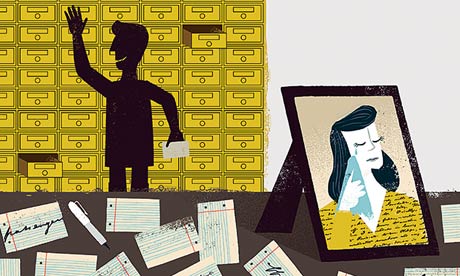
The first week of July 1776 was a busy one for Thomas Jefferson, and that's putting it mildly. The Declaration of Independence, which he largely wrote, was adopted on the fourth. So it might seem like a case of shoddy time management that he chose the same week to begin keeping a meticulous record of the temperature, updated multiple times a day in a notebook. This wasn't an isolated example: for eight years, as president, Jefferson made detailed notes on the seasonal availability of various vegetables in the markets of Washington, DC.
This wasn't because he couldn't focus, says Joshua Kendall, author of America's Obsessives: The Compulsive Energy That Built A Nation. Rather, his obsessional habits were a self-soothing response to anxiety. When his wife died, he responded by cataloguing the tens of thousands of letters he'd sent or received. "A mind always employed is always happy," he liked to say. But that wasn't a platitude, it was a life raft: some of Jefferson's compulsive industriousness made history, but all of it helped keep him sane.
The core of Kendall's argument is that many hugely successful people show symptoms of obsessive-compulsive personality disorder. (This isn't to be confused with the unwanted, intrusive thoughts of OCD: those with OCPD relish order and control.) Steve Jobs was notorious for flying into a rage over a misplaced comma; he rejected one version of the Apple II computer because the lines on its internal circuit boards weren't straight enough. But, if Kendall is correct, Jobs wasn't a narcissist, consumed solely by his own ambition: in fact, his focus on shaping and perfecting the physical world may have come from wanting to avoid confronting his innermost self. Kendall quotes a psychiatrist who says it often begins with an insecure upbringing: "Children who have little control over the key events and people in their lives begin to focus on something they can control." Avoiding self-reflection, these "obsessive innovators" make poor parents and partners. But their avoidance is also at the root of their success.
This is unsettling, since what psychologists call "experiential avoidance" – the effort not to feel certain feelings, or think certain thoughts – is widely condemned as a bad thing. It's blamed for everything from social anxiety to self-harm; the burgeoning field of acceptance and commitment therapy is dedicated to overcoming it, by helping people safely to "feel their feelings". Could it really confer benefits?
The question strikes deep at how we think about psychological disorders. By definition, they interfere with life. But what counts as interfering is subjective: is it "better" to be a great innovator and a mediocre spouse, or vice versa? (Even the most serious of disorders are similarly culture-dependent: schizophrenics hear voices, but whether that makes them patients or shamans is a matter of historical context.) The happiest among Kendall's obsessives are those with self-awareness: they chose to embrace their obsessions, accepting the downsides. The tragic ones kept trying to make their relationships conform to their rigid demands. A Wired magazine cover last year asked readers, "Do you really want to be like Steve Jobs?" In a work culture that increasingly uses "obsessive" as a compliment, it's worth pausing to ask the question.
oliver.burkeman@theguardian.com
Follow Oliver on Twitter

